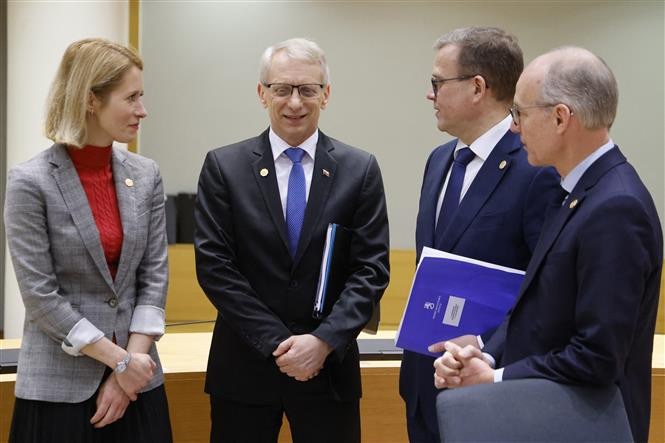In the context of an endless conflict dominated by the crisis in the Middle East - spending large sums of money on Ukraine would put great political pressure on governments in Europe.

As the Russia-Ukraine conflict enters its third year, Europe is facing increasing pressure over the ongoing fighting on its borders, which is difficult to predict over the next 12 months, according to CNN on February 23.
Arguably the most important of these challenges is how long the EU can sustain its dwindling financial support for Ukraine. The question is not new, but it is increasingly weighing on the minds of EU officials and reflects some harsh realities today.
The war in Ukraine has been at a stalemate for some time, while last week Ukraine was forced to withdraw from its stronghold of Avdiivka after months of fierce fighting, marking its worst defeat since the fall of Bakhmut in May 2023.
Much-needed aid from Washington is stuck in the US Congress, having been approved by the Senate but still needing approval from the House. EU-NATO unity is starting to fray, with almost every major decision delayed and threatened with veto.
There is no public Western voice calling for Kiev to abandon its support, but there is no denying that fatigue is setting in as resources dwindle. The Kiel Institute’s Ukraine Support Monitor says that since the start of the conflict, the EU and its regional allies have spent more than $100 billion in military aid on Ukraine.
Earlier this month, EU leaders agreed to a $54 billion aid package for Ukraine through 2027. Britain, seen as a major security player in the region, has also pledged more than $15 billion to Ukraine starting in 2022. Overall, the US has spent $66 billion, with another $60 billion in the pipeline, according to the Kiel Institute.
While Western support for Ukraine from 2022 has surprised many in the diplomatic community, the longer the conflict drags on, the more weariness is building.
In a context of an unending conflict dominated by the Middle East crisis – as well as internal concerns about inflation-driven cost-of-living crises around the world – spending large sums on Ukraine could be politically taxing for governments in Europe.
Political pressure over the budget will become more apparent as European Parliament elections take place in June, as well as national polls in many European countries, including Britain, a key partner of Ukraine.
European officials need only look to the difficulty US President Joe Biden is having with additional aid to Ukraine to see the real-world impact of funding a costly foreign conflict while running into domestic political trouble.
Adding to those challenges is the prospect of former US President Donald Trump returning to the White House next year.
Mr Trump has yet to spell out what his Ukraine policy will be, beyond saying he could end the conflict within 24 hours. His anti-NATO views and disdain for the EU are well known.
The coming months will therefore be crucial for Ukraine’s European allies. As the US presidential election approaches, the question of what will happen to European security without the US will inevitably arise. While it is true that Ukraine’s security is directly tied to broader European security, the immediate question of how to continue to support Kiev in Europe’s long-term goal of greater security independence remains unanswered.
Most Western officials say it is difficult but possible. “The EU is very good at raising funds and has tools that they are not using,” a NATO official told CNN.
The official said that Brussels should start looking at using money tied to frozen Russian assets to help fund Ukraine in the next 12 months. But the thornier issue is whether Europe can provide Ukraine with the weapons it needs to win the war without US support.
The answer is probably no: Europe simply does not have the manufacturing capacity to independently support Ukraine over the next 12 months. But Western diplomats are optimistic that arming Ukraine fits perfectly into Europe’s much-needed effort to reduce its dependence on the United States.
Officials point to a recent NATO-brokered deal in which European countries pledged to buy 1,000 missiles from American companies that will be built at a new German factory. Most agree that Europe needs to buy more weapons and have a security policy that is not too dependent on the United States. To achieve that without hurting the United States, signing lucrative contracts with American companies is one way to ensure a “win-win.”
TH (according to Tin Tuc newspaper)